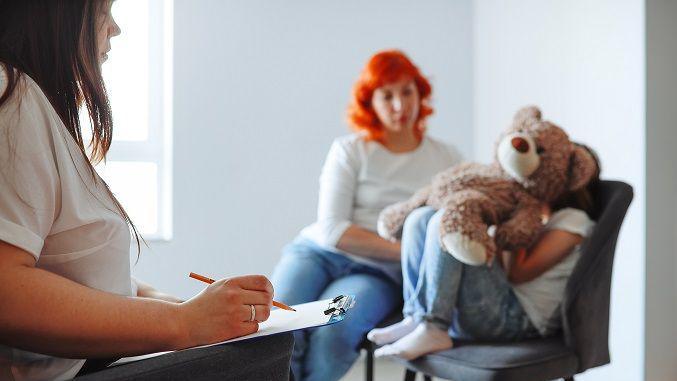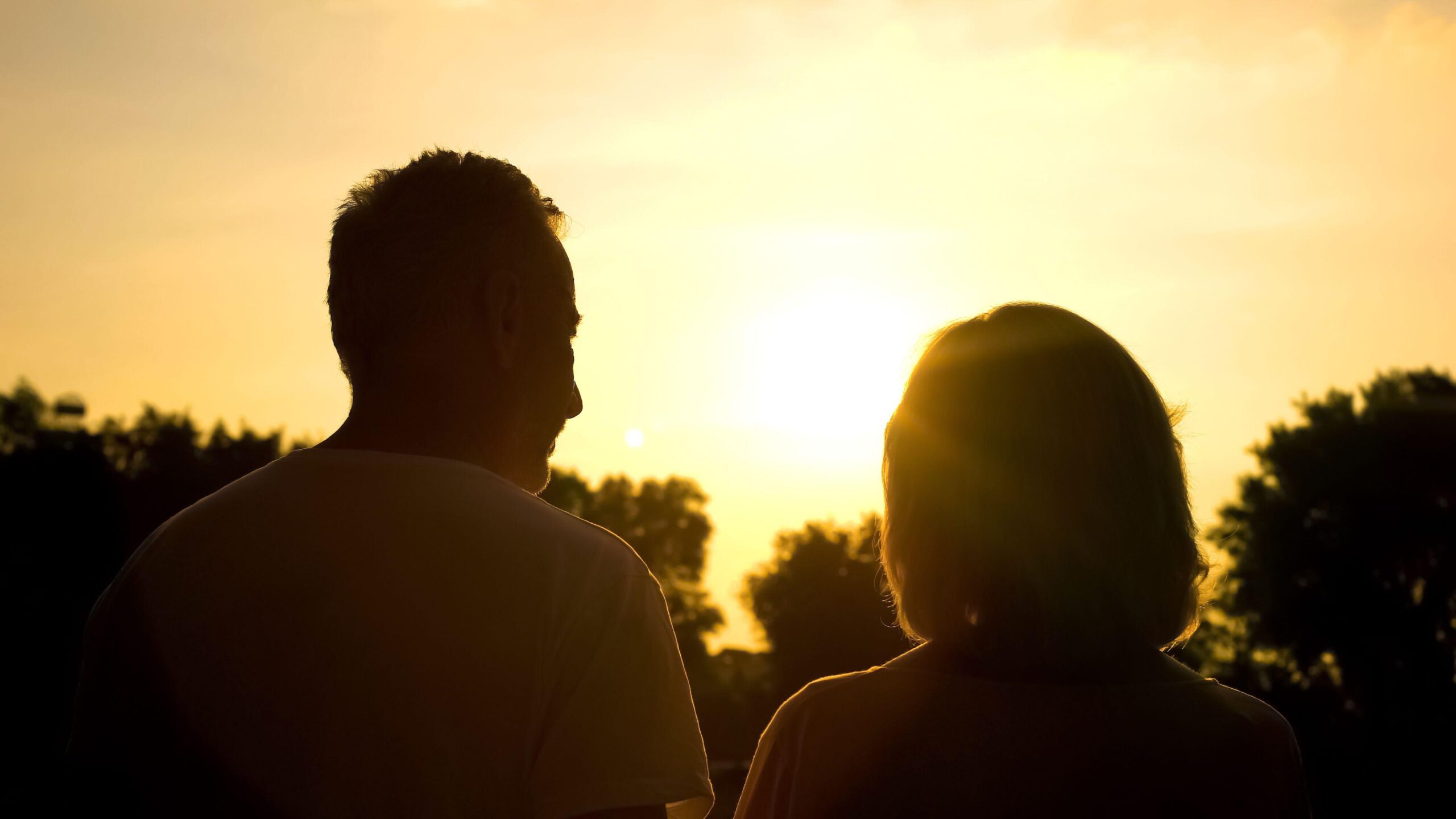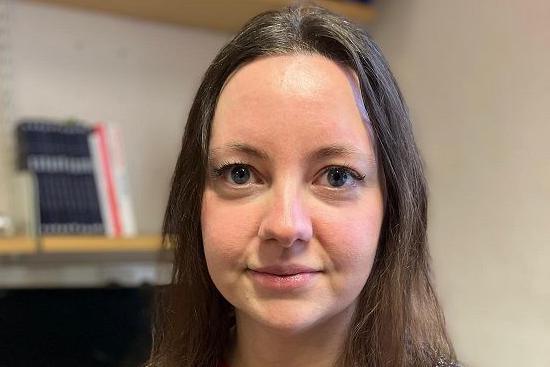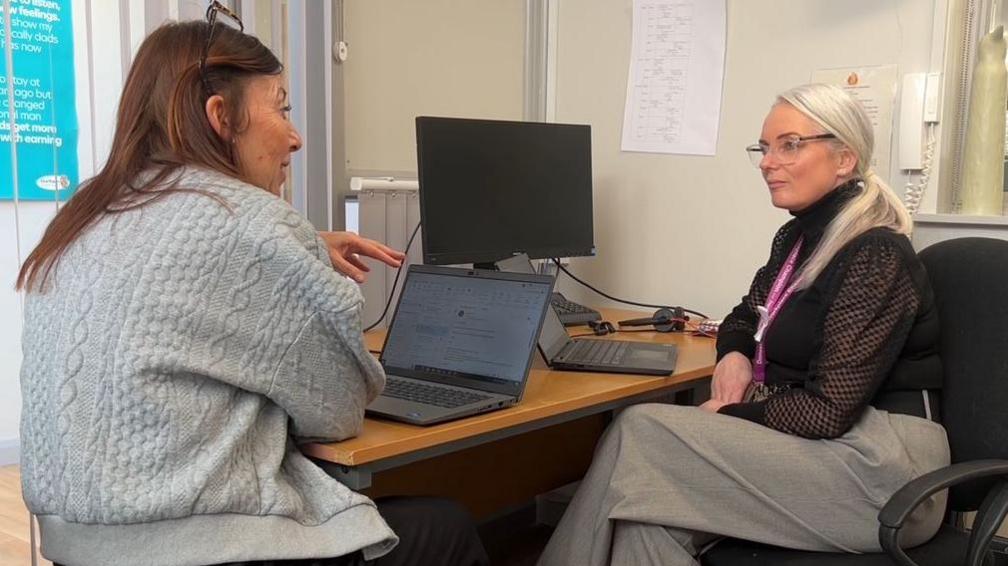violence
”When it’s your kids hitting you, you can’t leave’
https://www.bbc.co.uk/news/articles/cy7gz3xdelno
”When it’s your kids hitting you, you can’t leave’

Helen Richardson
Political Reporter, NE & Cumbria
Jane Downs
BBC North East & Cumbria Investigations
- Published16 March 2025
Parents and guardians who have suffered violence at the hands of children in their care say support services are a “postcode lottery”. Despite a seeming rise in attacks, alongside greater awareness, experts agree the problem is not being properly addressed.
Here, one couple share their experience.
“She had me round the throat one day,” Angela, a guardian to a young girl, told the BBC.
“Another time she had me against the bench with a knife at at her throat, saying she was going to kill herself and make me watch.
“That was a really, really scary time that seemed to go on forever.”
After a family breakdown, Chris and Angela (not their real names) took on the care of a female relative who was still at primary school.
Over time, they say, the child’s behaviour deteriorated until the couple realised they were in physical danger.
They were open with social services from the outset, but say their concerns were “minimised” and they were just told to “keep going.”
“What do we do when she’s smashing the house up or when she’s got me locked in a room?”

“Things were escalating beyond what was safe,” recalls Chris.
“I felt pathetic, because why should I have to call the police to protect us from an 11-year-old or a 13-year old? It’s humiliating.”
Chris and Angela say they eventually had no choice but to call the police, but attending officers made it plain the child would not be taken out of the situation, nor would charges be brought.
Violence on the rise?
Experts say child-to-parent violence and abuse (sometimes known as CAPVA, CPA or APVA) can be sparked by childhood trauma or a youngster witnessing domestic abuse in the home.
It can also be more common in families with neurodiverse children.
Because there is no standard definition for this type of domestic violence, offences are recorded in different ways across the country meaning it can be difficult to measure the scale of the problem.
We asked 39 police forces in England for the number of reported crimes involving adolescent or child on parent violence and abuse in their areas in 2015, 2019 and 2023.
Of the 17 forces which responded, 10 recorded more cases in 2023 than in 2019.
In north-east England, where Chris and Angela live, North Yorkshire, Northumbria and Durham police did not provide figures, but both Cumbria Constabulary and Cleveland Police reported an increase in cases.
One former social worker – who wishes to remain anonymous – told the BBC she witnessed violence against parents first hand, sometimes from children as young as eight.
She believes that, although the subject is now more openly discussed, services offered by some local authorities have yet to catch up with the level of risk some children present.
“These parents are dealing with this on a daily basis,” she says.
“I think things like social media, trying to manage the use of mobile phones, that’s becoming a real trigger point when they’re trying to put parental controls in place, because children don’t want that and they’re acting out.
“I’ve been in households where I’ve seen significant levels of harm directed towards parents and carers from children and, even with professional intervention to try to de-escalate, it has resulted in police call outs.”

Chris and Angela felt social services encouraged them to offer their child “leeway” rather than making it clear her behaviour was unacceptable.
“We’d tell them ‘look, we don’t think we can go on with this’,” says Chris. “We don’t think this is good for us or her.
“They would just blow smoke up (our backsides) about what a good job we’re doing. We felt hopeless.”
Angla adds: “Now she just thinks this is what people do.
“When you’re in an abusive relationship, you have the option to go. But when it’s your kids you don’t, do you?”

CAPVA researcher Dr Nikki Rutter believes early intervention is key for carers like Chris and Angela.
“Local authorities here in the North East are very good at responding to families where there are very particular high risk needs,” she says.
Dr Rutter points to what she sees as exemplary areas of practice in certain areas of the country, including Wales and Norfolk, but says problems lie in the systems that should refer families for help when they first have issues.
“Early intervention is very, very rarely occurring in any of the local authorities throughout the North.
“They’re dealing with the problem rather than preventing it in the first place.
“Sometimes it can be services saying ‘this isn’t our responsibility’, ‘we’re not commissioned to do this’ or ‘we are restricted in terms of staffing’.
“For those families it must just feel like there’s no way out or there’s not many people listening.
“Families are crying out for help, quite often from the child being four to five years old, and nothing is being done.”
Government plans pending
The government has pledged to halve violence against women and girls in the next ten years.
It says tackling abuse of parents in their own homes is a “vital” part of that challenge.
A Home Office spokesperson said: “We are continuing to develop our specific approach to child-to-parent abuse, taking on board the contributions to last year’s consultation.
“We will set out our plans in this area and respond formally to the consultation in the coming months.”

In County Durham, the police and county council have started jointly funding “ambassadors” to run a “Respect” programme with families that need help.
Young people and parents have their own workers who then come together over time to make changes.
Jackie Staff, one of the support workers, says violence towards parents and guardians is only just really starting to be discussed more openly, but things are changing as a result.
“We’re getting some real successes from the families,” Ms Staff says.
“They’re telling us that it is working and the behaviour has reduced.”
But Joy Allen, Durham’s Police and Crime Commissioner, says a lot of parents are still suffering in silence.
“One in 10 women who’ve been murdered by a man have been murdered by their son,” she says.
“That’s a significant fact that we need to address and early intervention is much better than escalating.
“We want people to have the confidence to come to us for support. It isn’t anything to be ashamed of and there is help out there.”
‘Let’s stop pretending’
Angela and Chris are clear about what they think needs to change.
“Definitely funding for children’s mental health I think is a massive thing, but also child-to-adult violence is not talked about,” says Angela.
“Parents are embarrassed. We were embarrassed.
“We didn’t want to tell anyone that this child has been violent. I think that’s a massive issue.”
Chris says he feels seeking support somewhere you can be honest about exactly what is happening is essential.
“Even if it’s Facebook groups, it’s people going through the same thing,” he says.
“Let’s stop pretending that this is not happening, that children aren’t being physically violent towards the parents.
“It takes the adults to do that, because the kids are never going to admit it.”
Mother Denied Justice Campaigns to Transform the Family Courts
https://filia.org.uk/latest-news/2021/12/22/mother-denied-justice-campaigns-to-transform-the-family-courts
Mother Denied Justice Campaigns to Transform the Family Courts
By Victoria Hudson, Founder of #JusticeForFCchildren #GetMHome and campaigner for the Redress/Justice For Family Court Children.
Victoria Hudson has been campaigning for several years to increase the protection of domestic abuse survivors and children who become entangled in the family court system. Tragically, Victoria and her daughter have themselves experienced untold suffering, trauma, and harm at the hands of the family courts.
Victoria, who campaigns under the banner #JusticeforFCchildren, worked alongside other campaigners to successfully lobby the Government to review unsafe contact orders and the removal of children by the family courts. A report, published by the Ministry of Justice in June 2020 laid bare many hard truths about long-standing failings, including harming children by placing them in danger by “enabling the continued control of children and adult victims of domestic abuse by alleged abusers, as well as the continued abuse of victims and children.”[1]
Victoria is now passionately driven to bring about the radical changes necessary to protect domestic abuse survivors and their children from harmful and unjust state systems and structures, by making the family courts and their proceedings more transparent.
Like too many other women experiencing domestic violence and abuse, instead of protecting them, the state colluded with Victoria’s abuser in the most punishing way possible by severing mother and child. In September 2018, Victoria’s daughter (then aged 2) was physically and forcibly removed from her family home and placed under a Care Order with her ex-partner, who is not biologically related to her. Many other children in domestic abuse cases are severed from their mothers by adoption; the mother being blamed for the abuse rather than protected, and their right to family life permanently erased.
For Victoria and other mothers in her position, it is ironic that the Joint Committee on Human Rights, is conducting an inquiry into hundreds of forced adoptions that severed babies from unmarried mothers during the 1950s to 1970s, when mothers experiencing domestic abuse are currently facing similar infringements of human rights in the family courts.
Victoria is requesting the Ministry of Justice immediately review of her case in the family courts and is requesting the Joint Committee on Human Rights conduct an inquiry into whether family court decisions are breaching rights to family life.
[1] “Assessing Risk of Harm to Children and Parents in Private Law Children Cases” (Ministry of Justice, June 2020)
If you want to support Victoria’s campaign, you can do three things:
-
First and foremost, email a letter to Lord David Wolfson MP, Minister for Family Courts to request that he instigates an immediate review of Victoria’s own case in the family courts. If successful, this will provide a test case for the campaign and lead to further reviews. Use this letter to draft your own. His email is wolfsond@parliament.uk
-
You can also email a letter to Ms Harriet Harman MP, Chair of the Joint Committee on Human Rights, requesting that alongside the current review into historic forced adoptions, she also orchestrates a review of family court decisions in relation to their impact upon the rights of children and birth mothers to family life. Use this letter to draft your own. Her email is harriet.harman.mp@parliament.uk
-
Help Victoria to get more supporters and allies by following and sharing #JusticeforFCchildren on Twitter @Victoria_Hudson and Facebook facebook.com/getmhome
[1] “Assessing Risk of Harm to Children and Parents in Private Law Children Cases” (Ministry of Justice, June 2020)